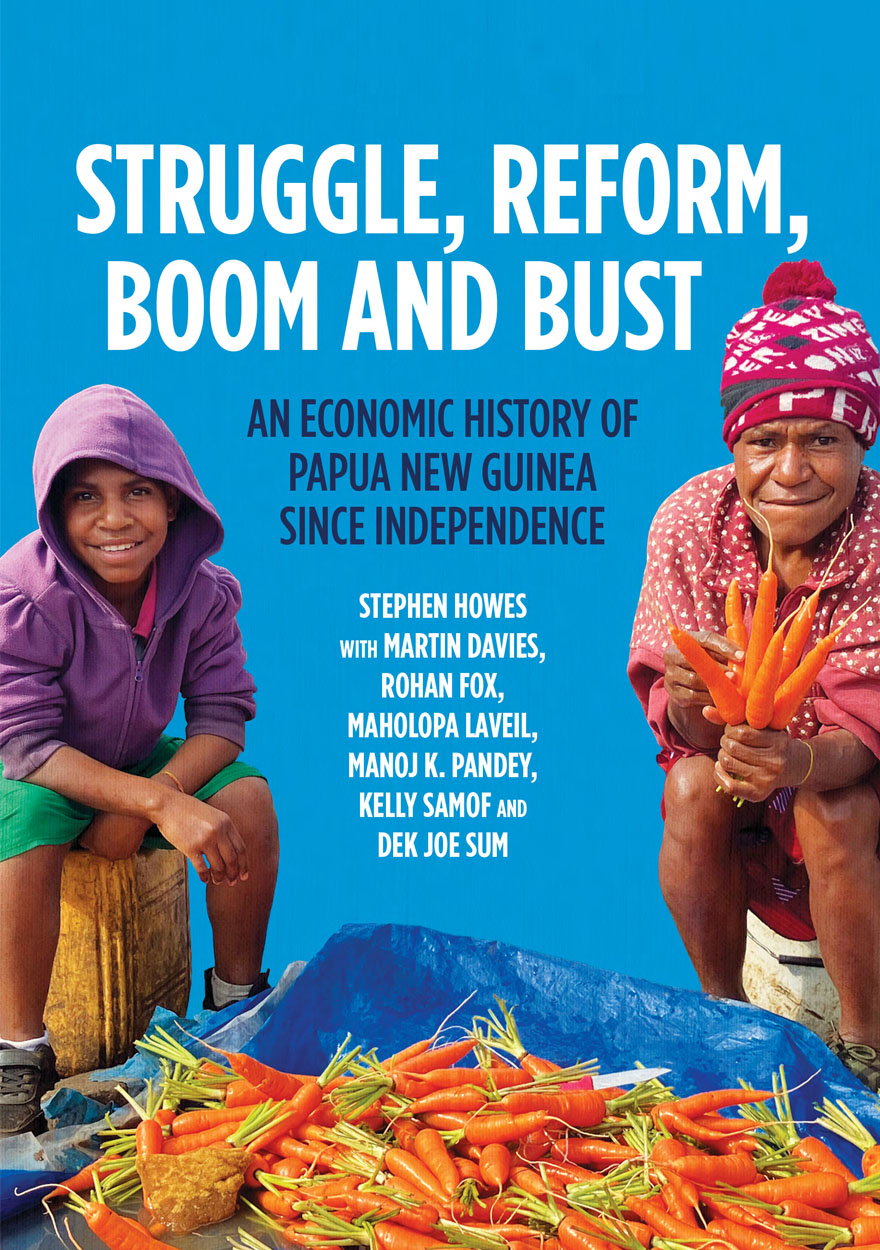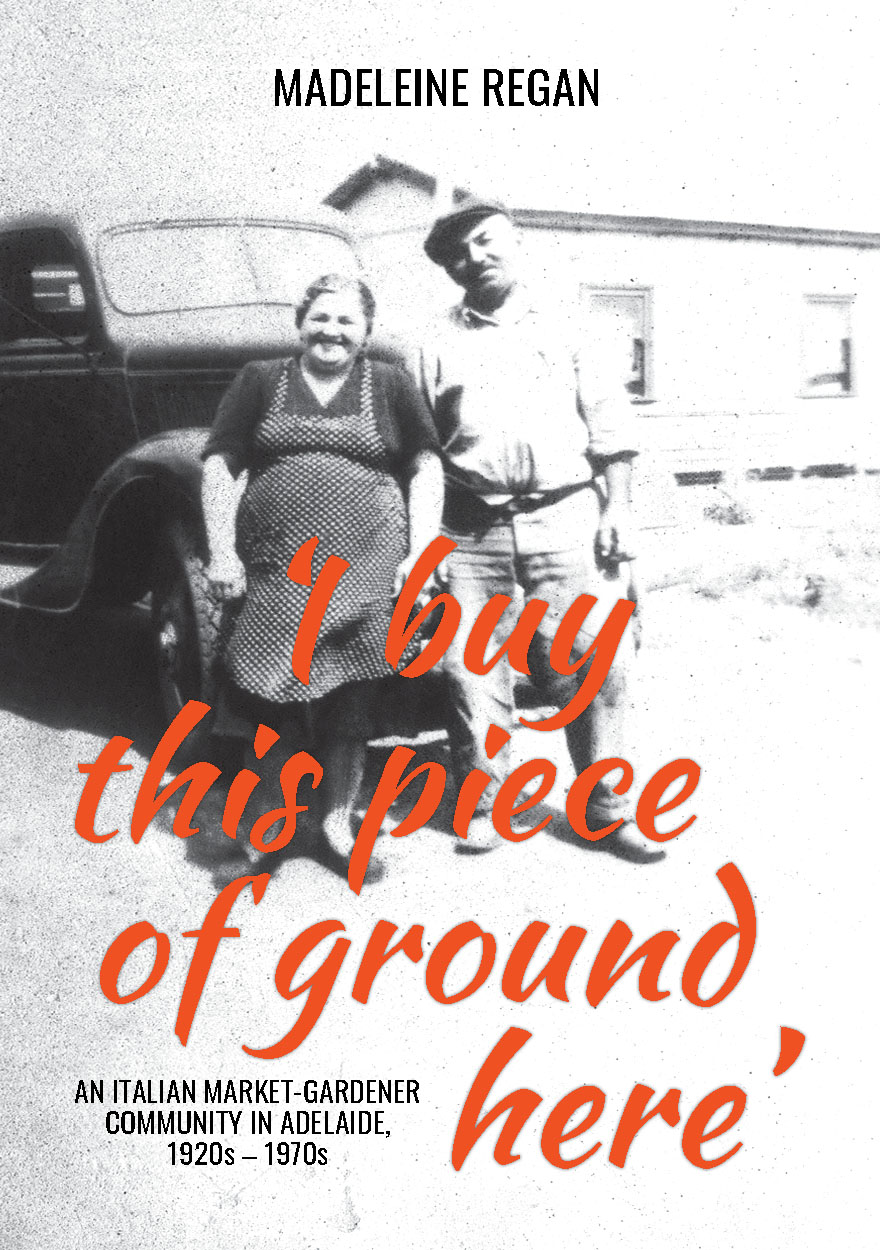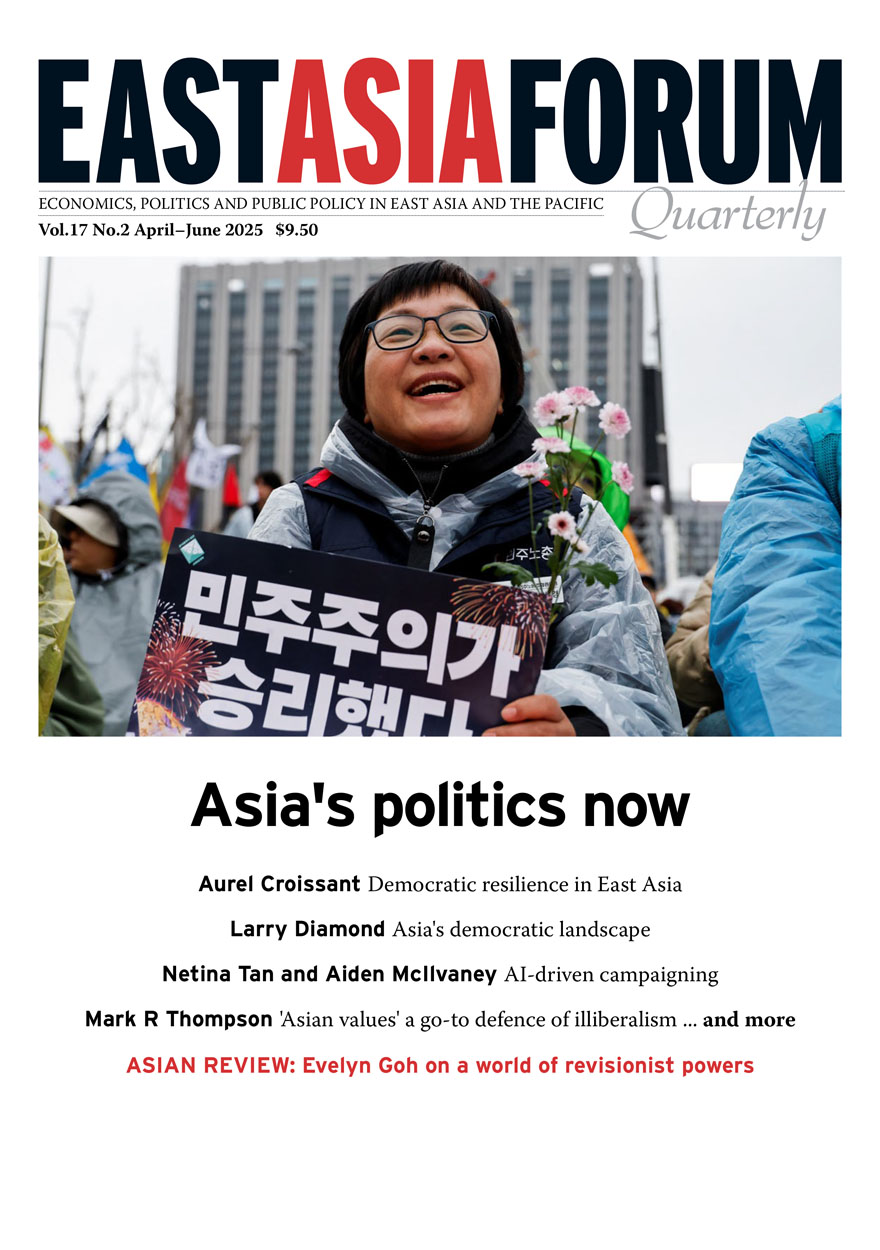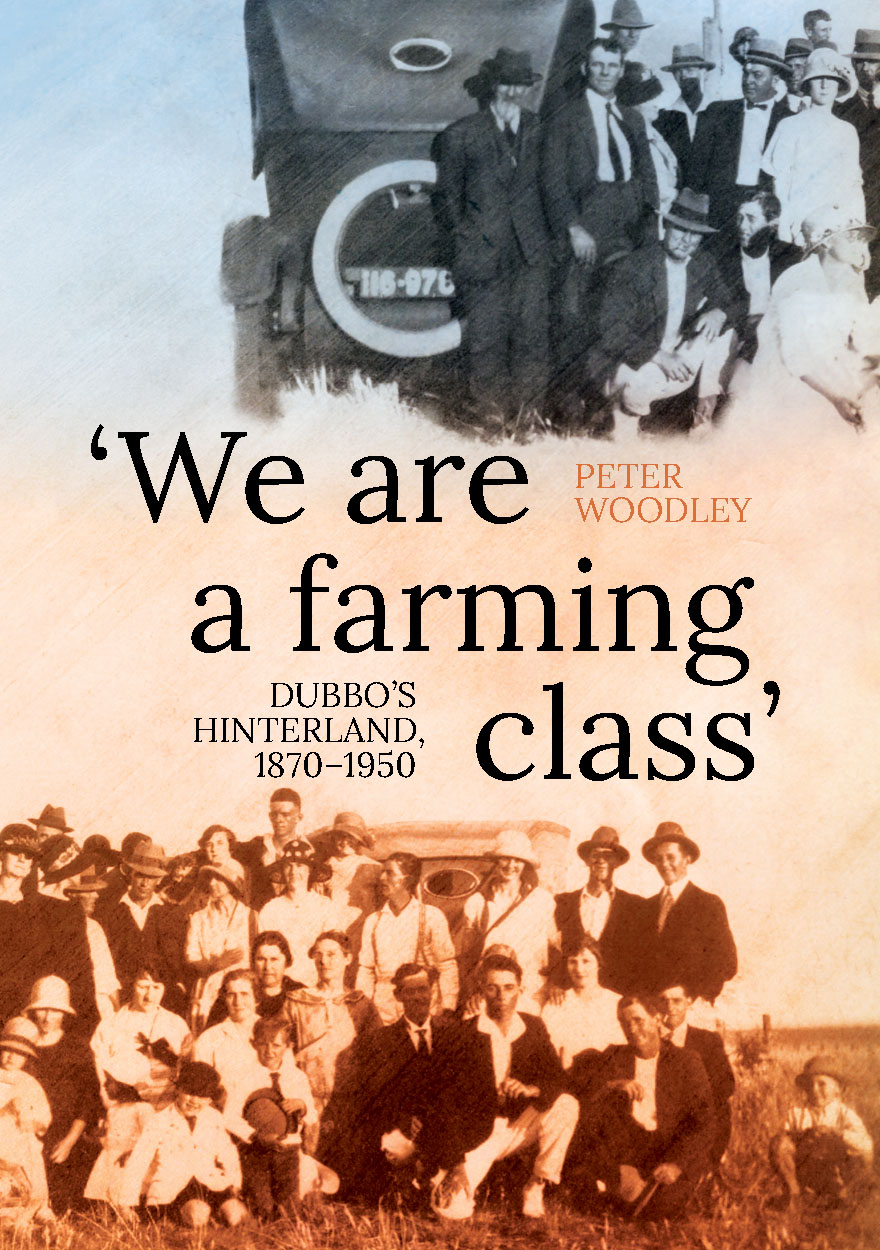Search titles
Displaying results 11 to 20 of 1138.

Strategic Imagination »
Essays in Honour of Brendan Sargeant
Edited by: Andrew Carr
Publication date: June 2025
This book examines the concept of ‘strategic imagination’ developed by Brendan Sargeant during his distinguished career at the Australian Department of Defence and later as a scholar at the Strategic and Defence Studies Centre (SDSC), The Australian National University. His tragic passing has left this powerful idea awaiting a proper examination. This volume seeks to provide that scholarly account and carry both the concept and Brendan’s legacy forward.
The book is organised in three parts. First, former officials like Dennis Richardson join leading scholars, including Mark McKenna, Anthea Roberts and Ian Hall, to explore the unusual conjunction of strategy and imagination, demonstrating its crucial role in effective scholarship and policy.
Second, analysts from Australia and worldwide examine how strategic imagination improves strategic practice by revealing hidden possibilities, catalysing essential conversations and challenging core assumptions.
The final section offers personal reflections from Brendan’s colleagues at the SDSC, providing a fitting tribute to his life and contribution. The volume also includes selections of Brendan’s own writing on strategic imagination, ensuring his voice continues to inspire scholars and officials to explore this rich and powerful concept.

Struggle, Reform, Boom and Bust »
An Economic History of Papua New Guinea since Independence
Authored by: Stephen Howes, Martin Davies, Rohan Fox, Maholopa Laveil, Manoj K. Pandey, Kelly Samof, Dek Joe Sum
Publication date: 2025
Since Papua New Guinea’s independence in 1975, economic growth has been slow but volatile, with major changes in economic structure and policies, as well as in politics and governance.
This economic history, written to commemorate the fiftieth year of independence and the first to be produced in some 15 years, divides the half century since independence into four periods: the relative stability but also early struggles of the seventies and eighties; the crises and reforms of the nineties; the boom of the 2000s; and the quiet bust of the 2010s. Two chapters cover each period’s major economic, policy, institutional and political developments. The final three chapters provide an overall assessment of economic performance and policies since independence and link them with its politics and institutions.
The book combines painstaking documentation with original analysis to reveal both the strengths and weaknesses of the PNG economy, and theorises that the country’s hyper-politics and insecurity have combined to produce, and are reinforced by, a weak but stable state, and low and increasingly resource-dependent growth.
Data-driven, frank, insightful and engaging, Struggle, Reform, Boom and Bust is written by an expert team of economists from the University of Papua New Guinea and The Australian National University under the leadership of Professor Stephen Howes, Director of the ANU Development Policy Centre. It is an essential resource for anyone interested in the economy of Papua New Guinea, as well as an important contribution to the literature on the challenges and institutional determinants of post-colonial development.
Coming soon
Notify me
Australian Journal of Biography and History: No. 9, 2025 »
Special Issue: Oceania Lives
Publication date: June 2025
This special issue of the Australian Journal of Biography and History, ‘Oceania Lives’, showcases a collection of writing and dialogue from an emerging group of Pacific scholars interested in rethinking Australia’s past and present through historical biography. While spanning multiple time periods, geographies, and communities, the issue draws its thematic coherence from a sustained exploration of the different ways in which Pacific peoples – in this case, South Sea Islanders/Australian South Sea Islanders, Papua New Guineans, Tongans, Pitcairners, West Papuans, Solomon Islanders and Fijians − have and continue to encounter Australian coloniality in its various forms.
The issue is notable for its inclusion of two dialogues, drawn from public events hosted in recent years by the Oceania Working Party of the Australian Dictionary of Biography. These dialogues, with their related emphases on indigeneity, relationality and knowledge production, set the scene for the entire special issue which aims to interrogate and explore the position of Pacific peoples on Indigenous lands and waterways which comprise contemporary Australia. Melinda Mann, Kim Kruger and Imelda Miller powerfully demonstrate how this can be done through their approaches to writing South Sea Islander biography while Lisa Hilli also reflects on her artistic and biographical method in conversation with Wendy Mocke about the FMI (or Daughters of Mary Immaculate) sisters of Vunapope, New Britain, who helped save hundreds of lives during the Second World War.
In addition to the dialogues, ‘Oceania Lives’ features four reflective pieces and three research articles. Using the Tongan narrative approach, talanoa-vā, Ruth (Lute) Faleolo and Emma ‘Ilaiū Vehikite use the written records of Wesleyan missionary Walter Lawry to reimagine the early 19th century voyage of Futukava to Australia. In ‘My grandmother is (not just) a small brown fragment’, Pauline Reynolds responds poetically to an archival note attached to a tapa or barkcloth donated to the Macleay Collections. Christopher Chevalier offers valuable reflections on the completion and publication of his biography of Solomon Mamaloni and Romitesh Kant pays special tribute to the work of Professor Brij Lal, a pioneer in Pacific biography and so much more. In their research articles, Talei Luscia Mangioni and Camellia Webb-Gannon bring to life the stories of Melanesian activist women Amelia Rokotuivuna from Fiji and the Black Sistaz from West Papua. Finally, Nicholas Hoare and Theresa Meki ask, ‘What ever happened to the Papua New Guinea Dictionary of Contemporary Biography?’ Their answers – like those of other contributors to this issue − point to both the challenges and opportunities in writing about and working with Oceania lives in 2025.

A Quiet Revolution in Indigenous Service Delivery »
New Public Management and its Effects on First Nations Organisations
Edited by: Deirdre Howard-Wagner
Publication date: May 2025
The government Indigenous service market that is now well entrenched in the public administration system has operated to marginalise First Nations people and First Nations organisations, who have had very little say, if any, over the last 20 years, about how government services are designed to meet their needs.
The chapters in this volume comprehensively describe and illustrate how the government Indigenous market, and the Indigenous service delivery system created around that market, have failed and why system change is needed.
The book offers the expertise of individual community-controlled First Nations organisations operating in urban settings in NSW, which variously operate as social enterprises, businesses, community development organisations, social service providers, representatives and advocacy organisations.
Concentrating on the experiences of individual First Nations organisations allows us to examine the complex, layered Indigenous service system as a multi-jurisdictional phenomenon on the ground in an urban context.

‘I buy this piece of ground here’ »
An Italian market-gardener community in Adelaide, 1920s–1970s
Authored by: Madeleine Regan
Publication date: May 2025
‘I buy this piece of ground here’ is a group biography that examines the lives and work of a cohort of Italian migrant families from the Veneto region who arrived in Australia in the 1920s and formed a new community and identity as market gardeners in outer suburban Adelaide.
This book investigates the settlement processes in a period of Australian migration history often overlooked in favour of post–World War II studies of mass migration and multiculturalism. It considers the impacts of the Depression, fascism, World War II, the White Australia environment that excluded southern Europeans and, ultimately, the suburbanisation that overtook their community.
Drawing on 65 oral histories with sons and daughters of the first generation, archival and published records, the narrative reveals what it felt like to work market gardens that became economic and emotional anchors for a new community. The first generation raised families, worked and bought the land, planted vegetables, bartered for glasshouses, sold produce at market, celebrated in packing sheds and established a stable, resilient community between the wars.
The Veneto families developed successful commercial market gardens and created a self-contained village or paese in a small area west of Adelaide. Withstanding marginalisation, the market gardeners lived and worked together in a small community, prospered and created an economy, a sense of belonging and a future for their children.
‘A formidably detailed piece of research and the product of a most fruitful community collaboration.’
—Frank Bongiorno AM, Professor of History, ANU

East Asia Forum Quarterly: Volume 17, Number 2, 2025 »
Publication date: May 2025
Asia is home to some of the world’s most diverse political systems—from liberal democracies to authoritarian regimes and hybrid states. As global democracy faces renewed pressure, this edition of East Asia Forum Quarterly explores how political systems across Asia are evolving amid rising autocratisation. It examines why economic development alone cannot explain democratic outcomes in the region and how authoritarian success stories are reshaping debates about governance. With ideological contestation intensifying, Asia is not just adapting to global political trends—it is helping to define them.
Download for free
Not available for purchase

Made in China Journal: Volume 9, Issue 2, 2024 »
Edited by: Ivan Franceschini, Nicholas Loubere
Publication date: May 2025
Chinese journalism is dead—long live Chinese journalism! The dramatic transformations in China’s media landscape over the past decade have led many to declare the death of quality journalism in the country. The Party-State’s tightening grip on information, the dismantling of once vibrant investigative outlets, and the growing precarity of media professionals seem to confirm this narrative. And yet, as traditional spaces for critical reporting shrink, new modes of journalistic practice continue to emerge, often in dispersed and unexpected forms. From citizen-led investigations and social media exposés to transnational collaborations, Chinese journalism has not disappeared—it has adapted. This issue of the Made in China Journal explores the shifting terrain of journalistic production in and about China, tracing the resilience, reinvention, and risks that define the profession today.

War 4.0 »
Armed Conflict in an Age of Speed, Uncertainty and Transformation
Edited by: Deane-Peter Baker, Mark Hilborne
Publication date: April 2025
This volume explores the impact of technology and new domains on future warfare. It identifies several themes, and highlights the increasing complexity of the security environment and the uncertainty of future war. The sense of time and speed has been, and is being, compressed by developments in quantum technologies, the cyber domain, artificial intelligence, the increased capabilities of sensors and data collection, as well as new propulsion technologies such as hypersonic designs. Concepts regarding the shape and extent of the battlefield are challenged by the notion of hybrid war and sub-threshold tactics, as well as new domains in which competition is increasing, such as space. Further challenging the shape of the battlefield is the increased development of remote and autonomous warfare. Commercial developments will affect how military production is owned and managed, and how military forces are composed.
Thus, a confluence of new technologies exists, combining to create the potential of fundamental transformation at many levels. This wave of technological change has been called the Fourth Industrial Revolution (4IR), characterised by an exponential rather than a linear rate of change, generated by convergence and complementarity of emerging technology domains. These may not affect the fundamental Clausewitzian nature of war, but they will likely affect its character. From a military perspective, the key will be the impact on the speed of operations and on the shape of the operational domain—the factors of time and space. The combination of these shifts will increasingly affect the perception of states and the degree of certainty in approaching and engaging in conflict.

Because COVID … »
Pandemic Responses, Rationales and Ruses
Edited by: Shirley Leitch, Sally Wheeler
Publication date: April 2025
The norms of everyday life were often cast aside during the pandemic years. States shut their borders, mothballed their economies, and locked down their cities. Individuals put family life, career goals, travel plans – even medical treatments – on hold. In Australia, a Government elected on a platform of neo-libertarian freedom and debt reduction, spent like Keynesians while curtailing even basic freedoms. Some citizens protested but most accepted curfews, mask mandates and the shuttering of schools and workplaces in exchange for the promise of safety.
Across every sphere of life, ‘Because Covid’ became an accepted shorthand, serving as both a response and rationale for previously unthinkable actions. Yet, it is always a mistake to take such things at face value.
Contributors to this book look beyond the rhetoric of Australia’s COVID-19 responses to consider where the pandemic has taken us as a nation. We examine economic policy, bioethics, freedom of speech, freedom of movement, global supply chains, public value science, violence against women, the experiences of Indigenous communities, news media practices, the arts sector, historical precedents, and more. What can we learn about managing future risks? What are the consequences, intended or not, of particular policy interventions? Are there new opportunities as normalisation kicks in? Our goal is to offer broad-ranging insights into the Australian experience at the very time the nation is beginning to learn how to live with COVID-19.

‘We are a farming class’ »
Dubbo’s hinterland, 1870–1950
Authored by: Peter Woodley
Publication date: April 2025
Notions of an arcadian farming life permeate settler-Australian understandings of themselves and their nation. Qualities of hard work, perseverance, resourcefulness, and a steady devotion to family and community—the historian John Hirst’s Pioneer Legend—are idealised in this nation. But the people from whom the legend is derived have rarely been studied in depth. They are more the stuff of myth and fond imagining than of concerted examination. To what extent is the legend built on lived experience? How have farming people thought of themselves and their contribution to a wider national mythos? ‘We are a farming class’ examines the lives of people in the farmlands surrounding Dubbo in the New South Wales central west between the 1870s and the 1950s, from free selection and the establishment of agriculture to the dawning of postwar prosperity and change. What emerges is a closely documented, ethnographically rich portrait of a way of life and culture at once distinctive and surprising, recognisable and unknown.



